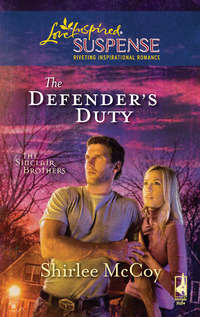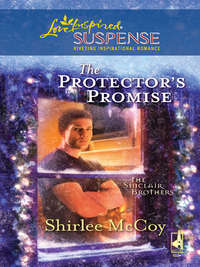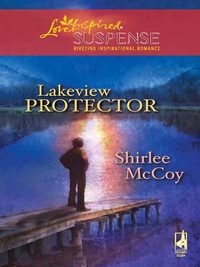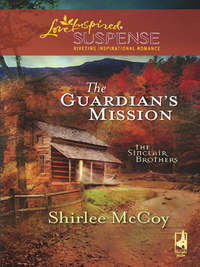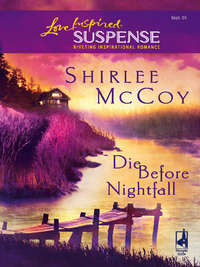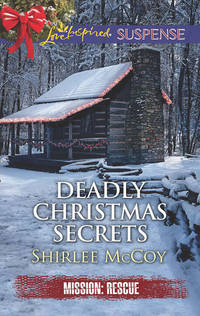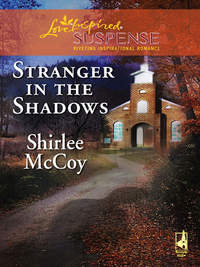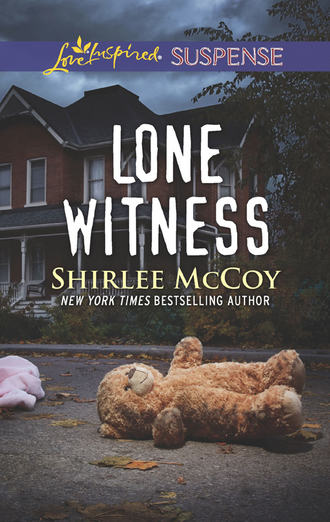
Полная версия
Lone Witness
He ran to his car and sped out of the driveway, the tires kicking up gravel as he turned onto the paved road. A purse sat near the curb, a phone several yards away from it. He’d seen a woman and man struggling with one another as he’d rounded the side of the house. She’d been shoved into the Jeep. Everly wasn’t alone. That didn’t make the situation any better.
He’d already lost his wife, Diane, in gunfire from a drive-by shooting. She’d been eight months pregnant with Everly and her twin sister, Aria. The surgeon had been able to save the girls, but Diane’s injury had proven fatal.
The heartache of saying goodbye to his wife had brought him to his knees. He didn’t think he could survive losing one of his daughters, too.
He rounded the corner at the end of the street, taking the turn so fast, he wasn’t sure all the tires stayed on the ground. Commercial Street was quiet as the shops that were usually bustling with life were dormant and dark, though a few exterior lights illuminated doorways and outdoor eating areas. Diane had loved Provincetown. It had been her family’s summer home when she was growing up. Now that she was gone, her parents lived there nearly year-round. Henry and the girls visited often, and they always spent the weekend closest to Diane’s birthday in town.
This was that weekend.
He’d had a full docket at work, and he hadn’t been able to take Friday off. His in-laws had picked the girls up after school and made the three-hour drive. He had finally clocked out of work just before midnight. He’d almost spent the night in Boston. He’d been that tired, that ready for sleep. But the girls had been looking forward to their yearly breakfast on the winter-cold beach—blankets spread on the sand, the sun rising above the ocean. All of them bundled up and pink-cheeked, adults sipping coffee. Kids drinking cocoa.
He hadn’t wanted to disappoint them, so he’d made the long drive, stopping a few times to drink black coffee and wake himself up. What if he’d stayed in Boston? Would he have arrived in the morning and been the first to realize Everly was missing?
He shuddered, forcing away that thought, and the fear. He needed to stay focused on the task. Taillights gleamed in the distance, as the car ahead cruised through the business district at a pace that was probably just under the speed limit. The driver had no intention of being pulled over for speeding. If he made it to Route 6, it would be easy for him to find a place to pull off the road and hide. There were small towns dotting the Cape, and plenty of places for someone to disappear if he wanted to. Henry couldn’t let him. For Everly’s sake, and for the sake of the woman who’d been thrown in the Jeep with her, he had to stop the driver before he made it out of Provincetown.
He accelerated to a dangerous speed, whizzing past shops as he closed in on the fleeing vehicle. The driver must have realized he was being followed. He took a hard turn onto a side street, the back wheel bouncing over the sidewalk. Henry did the same, easing up on the accelerator as he rounded the turn.
The Jeep had slowed, as the driver navigated the narrow side street and headed south. Henry’s cell buzzed. He ignored it. The Jeep slowed more, turning into an alley that Henry had walked down dozens of times when he and Diane were dating.
His hands tightened on the steering wheel, his heart galloping, the pace fast and erratic. He’d held Diane’s hand at the hospital after the shooting and promised her that everything would be all right, and that no matter what, he’d take care of their daughters. When the surgeon had told him Diane was brain-dead, he’d sat by her side and told her how much she’d meant to him, how fortunate and blessed he’d been to have her in his life.
And he’d promised her that the girls would be fine.
That he’d make certain they had wonderful lives.
He’d promised that they would know who she was and how much they’d meant to her.
He’d spent nearly six years working to fulfill those promises. He refused to fail now. He refused to believe that Everly would be taken from him, that she’d disappear like so many other children had. That he’d spend the rest of his life searching the faces of strangers, hoping to see his daughter.
The Jeep cleared the alley and bounced onto Conwell Street. Henry followed, the traffic light at Route 6 glowing green. It turned red as the Jeep approached. The driver slowed and then stopped. Perhaps out of caution. Perhaps out of habit.
Henry was closing the distance between them, not trying to hide the fact that he was following. He’d let the guy know he’d been seen, that what he’d tried to do under the cover of darkness had been exposed.
The light turned green as Henry neared the back bumper of the Jeep. He thought about clipping it, but worried that Everly would be hurt.
As the Jeep turned onto the highway, the back door flew open and a woman jumped out, Everly clutched against her chest. She stumbled and fell, skidding across the pavement on her knees, her arms still tight around his daughter.
She was up in a flash, sprinting toward buildings that she probably hoped would offer her cover or a place to hide. Everly hadn’t moved. She was limp as a rag doll, bouncing against the woman’s shoulder.
Henry threw the SUV into Park and jumped out, racing after her. Not caring about protocol, about securing the perpetrator, about doing any of the things he’d been trained to do. He was only worried about how still Everly was. How quiet. How completely unlike the bubbly little girl he knew her to be.
“FBI! Slow down and let me help you,” he called as he sprinted after the woman.
She didn’t believe him, of course.
She’d been traumatized and was running for her life with a child in her arms. He doubted his words had even registered. He’d spoken to victims of violent crimes. He’d interviewed witnesses. He knew how difficult it was to process information when the brain was bent on survival.
He tried again. “Ma’am! Stop! Let me help you!”
She darted between two buildings and entered an alley much too narrow for a vehicle.
He was right behind her, catching up fast. His attention was on Everly’s arm, flopping against the woman’s back. He’d never seen his daughter unresponsive. She was always filled with energy and verve. Unlike her twin, she was outgoing and talkative, her mouth running as often and as fast as her nearly six-year-old feet.
“Everly!” he called as he finally caught up to the woman. He grabbed her narrow shoulder, yanking her backward.
She whirled toward him, her arms wrapped around his daughter, her eyes wide with fear.
“Back off,” she panted.
“I’m her father,” he responded, dragging her farther away from the opening of the alley.
“You said you were with the FBI,” she replied, trying to pull away.
“I am.”
“You can’t have it both ways. You can’t be her father and with the FBI.”
“Why not?”
She scowled. “I already called the police. I can hear the sirens. They’ll be here any minute.”
He could hear the sirens, too, wailing in the distance, shouting that help was on the way.
Only help had no way of knowing where they were, and the perp was still on the loose. “Come on. Let’s get away from the street.”
He pulled her toward the far end of the alley, past a Dumpster and pile of dismantled cardboard boxes.
Something scuffled on the cement behind them.
He glanced at the entrance to the alley as a dark figure stepped into view. Tall and lean, his face hidden by the shadows, he took a step forward and pulled something from beneath his jacket.
Henry jerked the woman sideways, shoving her behind the Dumpster. He followed, throwing himself in front of her and Everly as the first bullet shattered the quiet and slammed into the metal near his head.
TWO
A bullet pinged off the brick building, the casing dropping to the ground and rolling under trash that littered the alley. Another slammed into the ground just beyond the Dumpster they were hiding behind.
Sirens screamed in the distance, but help was too far away. The next bullet could pierce the metal and slam into Tessa, the little girl she carried or the man who’d shoved them behind the Dumpster.
“We need to get out of here!” Tessa yelled as a third bullet hit the building just above them. Bits of brick and mortar rained down, clattering onto the ground and skipping across the concrete.
“It’s okay,” the man said, pressing her into the old brick wall. She knew the alley, the buildings on either side—a barber shop and an art shop—the streets that crossed in front and behind it. She knew where she was, but she doubted the police did, and she doubted that staying where they were was going to make anything okay.
“It is not okay,” she whispered, shoving against his solid weight, the little girl still in her arms.
“It will be,” he replied.
“How do you know?”
“He’s not going to come around the Dumpster. He has no idea if I’m armed.”
“He is armed. That’s what’s going to matter to him.”
“What is going to matter to him is escaping. He might want to get rid of a witness, but he won’t risk losing his freedom to do it.”
It made sense, but that didn’t make her feel any less like a sitting duck.
She shivered, her body smashed between the wall and the man.
She hated the feeling of helplessness that brought, the memories that clawed at the back of her mind. Other dark mornings and late nights when fear had made her cower and beg. When she’d fled Patrick, she’d promised herself that she would never do those things again. That she would fight or go down trying to.
She tried to move, but the man was a solid mass of muscle and sinew, all of it focused on keeping her where she was.
“Let me go,” she demanded, her voice shaking.
She hated that as much as she hated feeling helpless.
He stepped back, just enough to let her breathe. She inhaled cold air and baby shampoo. She’d done what she’d set out to do. She’d kept a child from being kidnapped. Now, she wanted to go to the diner and get back to the familiar routine of prepping for opening. That felt safe to her, and it felt more right than staying in the cold alley waiting for the police to arrive.
“I need to get to my job,” she murmured.
“Your boss will understand if you don’t show up,” the man said gently, reaching for the little girl and taking her from Tessa’s arms.
“You don’t know my boss.”
“No. I don’t,” he said, his attention on the child.
“He’s counting on me to open the diner.”
“The police will want to speak to you first.”
“They can find me at Ernie’s.” She knew it was unreasonable. She knew that she needed to stay where she was. The police would want to speak to her. She’d have to give a statement. There’d be dozens of questions about what had happened and what she’d seen.
But, all she wanted to do was walk away.
Just like she’d done three years ago.
She knew that wouldn’t solve anything. Running from problems never did. Her grandmother used to tell her that. The one person in her childhood who had actually cared, Hester had done her best to give Tessa a firm foundation on which she could build a better future.
It had taken way too many years for Tessa to do that.
“The police will know where that is,” she continued.
“You’re in shock. You’re not thinking clearly. If you were, you’d realize that the best thing for you and my daughter is to wait here until police and medics arrive,” the man said in the calm and patient tone she would have used with a screaming toddler tossing biscuits on the floor of the diner.
“Is she really your daughter?” she asked.
“Yes.”
“I’m sorry this happened to her.”
“Me, too,” he responded, frowning as he looked at the little girl. “She’s never this soundly asleep. Everly?” He brushed a strand of hair from her cheek.
“Her pulse is good. I checked in the Jeep.”
“Thank you for doing that, and for saving her.” He shrugged out of his jacket and spread it on the ground, stepping far enough away that Tessa could have left if she’d really wanted to. He laid Everly on the coat, checking her pulse and then running his hands down her arms and legs.
“No breaks,” he murmured, reaching into his back pocket and tossing a phone in Tessa’s direction. “Can you call nine-one-one? Give the police our location and ask for an ambulance. Make sure they know this is related to the report of a kidnapping.”
She made the call, her hands shaking, her voice trembling. When the operator asked for her name, she hesitated before giving it. She’d worked hard to create a life she could be proud of, one she thought that God would approve of and that her grandmother, who’d died when she was fourteen, would have applauded. She was risking that by allowing herself to be drawn into someone else’s drama. The fact was, in the past, she’d done things she wasn’t proud of. None of the people in her new life knew that. None of them really knew her. Not the real her. She wanted to keep it that way.
But, she also wanted to help.
She wanted to make certain that the person who’d tried to kidnap Everly didn’t try to kidnap another child. She wanted to do the right thing, because it was right. Even if it cost her everything she’d worked for.
She crouched next to the man and his daughter, watching as he checked the little girl’s bruised shins and bare feet. He pushed up the sleeves of her nightgown, turned her arms so the exterior building lights fell on them. There was a smudge of blood on one arm, and he paused, studying it for a moment.
“What is it?” she asked.
“Puncture wound. She was drugged.” He took off his flannel shirt and tucked it around Everly, his face hard, his expression unreadable. He had a five-o’clock shadow on his chin and dark circles beneath his eyes. Short hair. Muscular build. Even if he hadn’t told her he was with the FBI, she’d have guessed he was law enforcement or military.
“Your wife must be worried sick,” she said, imagining the girl’s mother waiting at home, praying that her daughter would be returned. “Maybe you should call her and let her know you found Everly?”
She handed him the phone, and he tucked it into his pocket. “Her mother died the day she and her twin were born.”
“I’m sorry for your loss,” she said.
“Thank you. It was difficult. Some days, it still is. Diane was a wonderful person. She would have been a great mother. I wish she would have at least had the chance to meet her daughters.”
“I can’t imagine how hard it must have been to grieve her loss while trying to take care of two newborns.”
“They were in the NICU for a while, and my in-laws were a huge help. By the time I brought the girls home, I had people lined up to step in and help out. I’m very fortunate in my friends, and I’m very fortunate tonight ended as well as it did.” He touched Everly’s cheek, tucked the shirt around her a little more tightly.
Police lights flashed on the pavement and a radio crackled. Help had arrived. Soon half the population of Provincetown would be aware of the attempted kidnapping. People would be congregating on the street, trying to get a look at the girl and her rescuers. There would be local reporters jockeying for position, trying to get the best photo and the best answers to the most insightful questions.
A story like this could make national news.
And Tessa couldn’t afford to be part of that.
She stepped away from the Dumpster, and the man, easing toward the back of the alley. It led to a side street that would take her to Ernie’s Diner if she followed it long enough. She’d already given her name to the 911 operator. The kidnapper was probably halfway to the mainland by now. If he was smart, he’d never return.
She’d go to work. She’d open the diner. She’d go on with her day and hope that her name would be overlooked or misplaced or forgotten.
It was a vain hope, of course.
They recorded 911 calls.
Eventually, the police would track her down and interview her. She’d be happy to provide whatever information she could. Right now, though, she was going to put distance between herself and the drama. She took another few steps away, shivering as cold wind whipped through the narrow alley and scattered bits of debris. The sun had begun its ascent, and the sky was gray with deferred light. She could see Everly clearly—the soft slope of her chin and cheek, the darkness of her lashes. Her father had pulled the edges of his coat around her tiny body, and his dark T-shirt clung to broad shoulders and a firm abdomen. He had to be cold, but he didn’t shiver. His focus was on his daughter, and that gave Tessa plenty of opportunity to leave.
God, please don’t let anything horrible be wrong with Everly, Tessa prayed silently as she shuffled backward.
A police officer stepped into view, his radio crackling as he hurried toward Everly.
Tessa turned and walked away.
She knew how it was done. She’d done it before, parking the Cadillac Escalade that Patrick had given her for her birthday in a mall parking lot and walking away as if she had every intention of returning. Head high, like she’d been doing nothing wrong, the backpack slung over her shoulder filled with everything she’d needed to escape.
Shoulders straight, chin up and a quick stride that didn’t seem rushed. She did the same now. Confident. Focused. Completely unremarkable.
The alley was short and she walked out of it without anyone trying to stop her. She turned onto a narrow through street that was really nothing more than a paved path. Maybe she wouldn’t go to the diner. Maybe she’d go back to the cottage, gather what she could and leave town. She’d done it before. She could do it again. Make her escape. Start fresh.
She thought she heard someone call her name, but she didn’t look back. There wasn’t a police officer in Provincetown who hadn’t eaten at the diner. They knew her, and they knew how to find her.
For now.
That might change, because she didn’t feel safe, like she had the day she’d driven into town and seen the ocean stretching out to one side and the bay to the other. It had been summer, the streets crowded, the beaches filled, but she’d felt solitude in the ocean breeze and peace in the warm sunlight streaming from the cloudless sky.
Cold wind blew through her cotton shirt. It had been crisp white and wrinkle-free when she’d left home. Now it was crinkled and smudged with dirt. She wiped at the spot, shivering as she checked for the key she always carried in the pocket of her slacks. It was still there. She’d dropped her purse. It was probably lying on the road, her identification and bank card easy pickings for anyone who might find them. She’d lost her phone. It had probably shattered when she’d dropped it.
“That is the least of your worries,” she muttered as she wound her way behind commercial properties and, finally, walked out onto Commercial Street. She could see the bay from here, silvery blue in the lightening gloom.
She glanced back, but no one was following.
The medical and emergency-response teams were busy helping Everly.
Headlights illuminated the grayish world and an SUV drove past. Provincetown was waking, and the people who made it their year-round home would soon be out and about. According to her watch, she was twenty minutes late for her shift. The diner was still dark, the garish neon sign Ernie had purchased when he’d opened the place hanging listlessly from the clapboard siding near the gabled roof. The building had been around for over a hundred years. Some people said it had been a tavern back in the days when Provincetown had been a haven for writers, actors and freethinkers. Now it was a haven for people who enjoyed quiet and anonymity, who craved peace the way others craved chocolate.
Tessa unlocked the front door and stepped into the dining area, her heart still racing, her body almost numb with cold and fear. She had prep work to do before the line cook arrived—setting the daily special, putting out silverware and making sure the closing crew had cleaned the place to Ernie’s standards. This time of year, staff was cut in half, days were slower and profits were slimmer. Ernie demanded a high work ethic from his employees and expected them to do whatever jobs were necessary to keep the place going.
Tessa had proven herself to him and to his wife. Unlike her husband, Betty had a soft edge and a warm nature. As far as Tessa knew, they’d never had children.
Of course, she hadn’t asked.
She’d come to Ernie’s for a job. Not for friendship or support.
She flicked on the lights, hung her coat on a hook near the door and hurried across the room, grabbing the cart of napkin-wrapped silverware from its place near the waitress station and rolling it into the dining room. There was seating for one hundred there. The patio out back seated another twenty, the view of the bay making it a prime location during the tourist season.
It was so much easier to think about that than to think about the attempted kidnapping. Everly. The man with the gun and the pale face. Her breath caught as she set silverware on place settings and tried not to hear the sirens that were still screeching in the distance. This type of crime didn’t happen in Provincetown. Kidnapping wasn’t a thing in the quaint artsy community.
Someone knocked on the diner’s glass front door and she screamed, whirling toward the sound, a set of silverware falling to the ground. She recognized Ernie immediately, his white hair gleaming in the exterior light as he unlocked the door and stepped in, Betty close behind him. A police officer followed, standing in the entryway, her hat in her hand, her gaze fixed on Tessa.
“Tessa! What in tarnation are you doing, girl! You were just involved in a kidnapping. The police scanners are going crazy!” Ernie charged toward her, his white beard making him look like an angry grizzled gnome. “And you’re here, setting silverware on the tables!”
“Ernie! Hush! Can’t you see she’s in shock?!” Betty said, taking off her coat and wrapping Tessa in scratchy wool and day-old perfume.
“And, look.” Betty touched a throbbing spot on Tessa’s temple. “What a goose egg! She probably has a concussion. You probably have a concussion,” she repeated, cupping Tessa’s cheeks and looking into her eyes.
“I’m okay,” Tessa protested.
“Of course, you’re not,” Betty replied. “You’ve been through a terrible trauma, you got knocked in the head. More than likely, you feared for your life. Right?”
“Yes,” she murmured, trying to avoid looking anywhere except Betty’s face. As a child, Tessa had often lain in bed, listening to her mother partying with her newest boyfriend and wondering what it would be like to have a mother who cared. In her imagination, that kind of mother had always looked like Betty—soft face, soft eyes, soft curves and easy smile.
“Exactly. You’re not thinking straight. That’s why you left the scene instead of sticking around to talk to the police.”
It wasn’t a question, but Tessa nodded.
“It seemed to the responding officer that you were fleeing the scene. I told him that probably wasn’t the case. Fleeing would make no sense, seeing as how we all know exactly where to find you,” the officer said, and Tessa finally met her eyes.
Holly Williams had joined the Provincetown Police Department a few months after Tessa arrived in town. Young and brash, she had a no-nonsense approach to life that was obvious when she ate at the diner and when she attended the church they both belonged to. She didn’t suffer fools gladly, and she certainly wouldn’t believe lies. Not that Tessa planned to tell any. She hadn’t told anyone in Provincetown about her old life, but she hadn’t lied about it either. She’d simply come to town with a new identity, found a job and made a home for herself. If people asked about the past, she sidestepped the questions or gave vague answers that excluded details.


